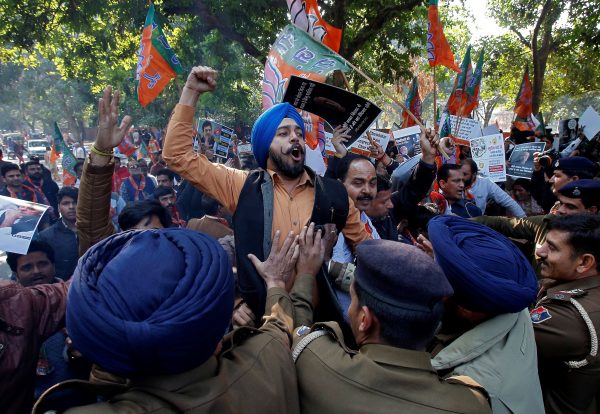Internationally, the dominant story has been the continued escalation of Hindu sectarianism resulting in violence. The sorry saga of north Indian ‘cow vigilante groups’ hunting down and lynching Muslims for allegedly selling beef took an even more ominous turn when a mob murdered a police officer investigating claims of cow slaughter in a town in Uttar Pradesh, India’s largest state. Even more disturbingly, Yogi Adityanath, the state’s Chief Minister, reportedly pressed police to arrest those responsible for the alleged cow slaughter — but initially said nothing about the officer.
The BJP has expressed increasingly overt support for provocative religious mobilisation by Hindu nationalists, the party’s core constituency. In the southern state of Kerala, protests over a Supreme Court order opening a local temple to women became a national issue when BJP leaders supported the protestors and warned the state government against arresting them. In Ayodhya, the recurring sore of Indian politics, Hindu nationalists again congregated in large numbers to demand the construction of a temple where they had once torn down a mosque. One BJP member of parliament called for the demolition of India’s leading mosque, Delhi’s Jama Masjid, claiming it was built on the ruins of a Hindu temple — the same claim made about the mosque in Ayodhya.
Noticeably, except for the case of the Kerala temple, all these appeals to Hindu sentiment are focussed on identifying Muslims as scapegoats. This exemplifies Hindu nationalism’s enduring trait: obsession with the idea of Muslims as invaders who need to be repelled. Signs of the insecurity felt by India’s Muslim minority are common. One survey in December 2018 revealed pervasive distrust of the police among Muslims. In Prime Minister Narendra Modi’s home state of Gujarat, the site of a notorious anti-Muslim pogrom while Modi was chief minister, there were reports in November that Muslim students were required to identify their religious status on exams.
At the same time, the government often seems to subordinate independent institutions to political calculations. The Central Bureau of Investigation’s director was sacked in October, perhaps for investigating a controversial defence purchase. The head of the central bank resigned in December amid reports of tension with the finance ministry. The government controversially revised GDP growth rate calculations to present the preceding INC-led government in a poorer light, only a few months after a report showed a conflicting picture.
National elections seem to be driving many of these actions. There are signs that the party is losing support, especially among farmers. Modi’s ill-conceived 2016 decision to abolish large-denomination currency notes had its most adverse effects on rural areas. Conflicts among farmer castes over affirmative action quotas for ‘Other Backward Classes’ weakened BJP support among a core constituency, especially in Rajasthan. More generally, Modi suffers from having promised too much and delivered too little. Even his quixotic decision to build the world’s largest statue to honour ‘Sardar’ Vallabhbhai Patel, an independence-era leader from his home state, backfired.
The BJP fared poorly in elections in 2018. Early in the year, the party broke through in several small states in India’s northeast. But in the large states where national elections are won, the BJP lost seven parliamentary seats it had previously held in by-elections across the country. At mid-year, the party’s hopes of taking power in Karnataka, a large southern state ruled by the INC, were disappointed. Local elections in Kerala held after the temple agitation left the BJP empty-handed. And at year’s end, the INC stunningly ousted the BJP in three crucial states — Rajasthan, Madhya Pradesh and Chhattisgarh.
These victories marked the arrival of Rahul Gandhi, the scion of India’s leading political family, as a political force to be reckoned with. They also served notice that little has changed in the INC. The choice of chief minister in the three states was left to Gandhi as party president. He backed the old guard over younger leaders who, like himself, came from notable political dynasties. Nationally, Gandhi — the son, grandson and great-grandson of previous prime ministers — is clearly the party’s leader. But his ability to become prime minister if the INC emerges victorious will depend on acceptance from regional allies — caste, ethnic and communist parties — on whom the INC still depends.
Arun R Swamy is Associate Professor of Political Science at the University of Guam.
This article is part of an EAF special feature series on 2018 in review and the year ahead.

